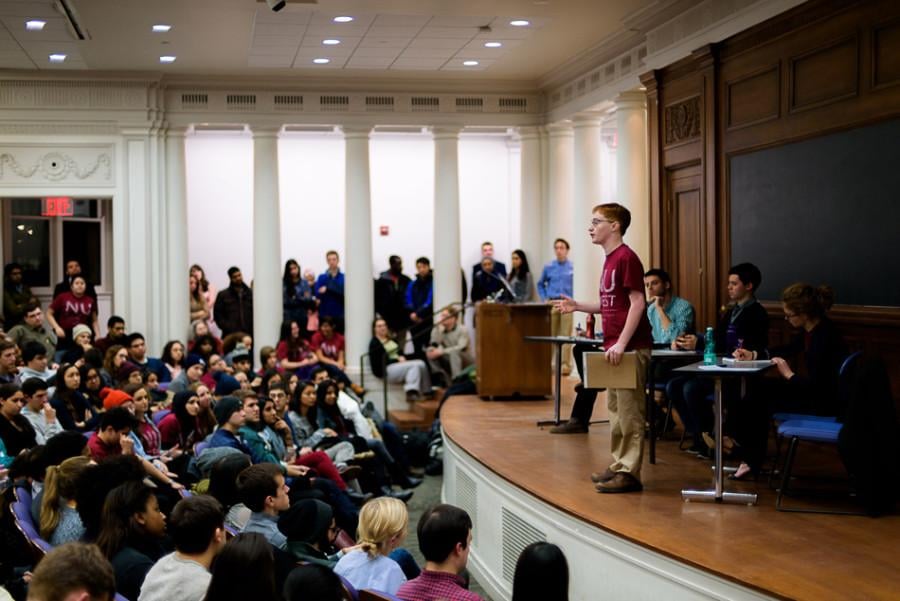NUDivest, Coalition for Peace talk divestment at Political Union
Weinberg junior Noah Whinston speaks on behalf of NUDivest at a panel hosted by NU Political Union. NUDivest and NU Coalition for Peace formally met for the first time at Monday’s discussion.
February 9, 2015
Students involved with Northwestern Divest and Northwestern Coalition for Peace met in person for the first time at a panel hosted by Northwestern Political Union on Monday night.
NUDivest is a movement pushing for the University to divest from six major corporations it believes NU invests in that are “profiting off of the illegal occupation of Palestinian lands,” according to its website. Coalition for Peace does not believe divestment from Israel is the solution in the Palestinian-Israeli conflict and rather argues for a two-state solution.
More than 200 people attended the panel to hear about each campaign’s objectives, especially because the two had never met before and there was “no real communication between the two sides,” Political Union co-president Alexi Stocker told The Daily.
The Weinberg junior said that when he reached out to the two campaigns about putting the event together, they were both receptive despite controversy on social media surrounding both.
Political Union wanted to hold an event for NUDivest and Coalition for Peace earlier in the quarter, but the group wanted to take the time to properly execute it, speaker Connor Tatooles told The Daily.
“I hope people take away each of their main messages and people can make informed decisions on who they want to support,” the Weinberg senior said.
Tatooles mediated the panel, and asked two Coalition for Peace members and two NUDivest members five questions about their campaigns’ objectives.
Weinberg junior Noah Whinston and Weinberg senior Moira Geary spoke on behalf of NUDivest. They focused on their belief that in keeping University money in the corporations that the movement has cited, students are abandoning moral responsibility to Palestinians.
“There aren’t two sides to facts about human rights,” Whinston said during the event. “There is never any gray area when it come to human rights violations. That’s why they’re called human rights. It’s a debate over whether Israel has the right to oppress people. The answer is no.”
Weinberg junior Jonathan Kamel and Weinberg senior Josh Boxerman of Coalition for Peace argued that divestment is not a viable solution because it does not focus enough on the larger political conflict.
“It’s a bigger issue than just divestment,” Kamel said. “It’s a bigger issue than just human rights. Divestment won’t solve those issues.”
Kamel also argued that the only way to peace in the Palestinian-Israeli conflict is through a two-state solution. He said divestment prevents this because it calls for the destruction of the state of Israel.
Whinston said that despite differences in opinion, both sides were able to come to an agreement that the conversation they had is valuable as long as it leads to productive action.
“The purpose was to set some facts straight and flesh out the differences,” he told The Daily. “It achieved its goal.”
NUDivest plans to bring up the points it discussed in a divestment resolution to Associated Student Government. In the resolution, NUDivest will ask for more transparency and that the NU Investment Office divest from the corporations in question.
“We all currently benefit from the human rights abuses,” Whinston said. “It’s the difference between making the most money and making money in the right way.”
Boxerman said even if ASG adopts NUDivest’s resolution, it won’t end the bigger issues of conflict and oppression.
Political Union representatives said both groups presented their arguments respectfully.
“I think a lot of people tend to underestimate how respectful Northwestern students are of each others’ opinions,” Stocker said.
Email: [email protected]


